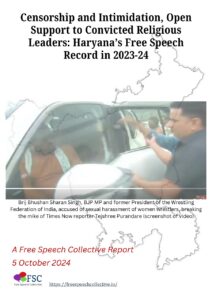A year since the start of the longest communications clamp down, Free Speech Collective reached out to journalists from Kashmir to mark the day with their voices about a year in the abyss.
[wpvideo Yydud8rE]
“I would have loved to send video messages…can’t as we are running on 2g network” – Suhail Naqshbandi.
On Aug 5, 2019, the abrogation of Art 370 and Art 35A of the Indian Constitution struck a body blow to the people of Jammu and Kashmir, dismembering the state into two union territories and dissolving the meagre protection the people of the state had over their land.
In the midst of the most massive military presence, the complete shutdown of all communication networks – landlines, broadband, mobile phones, roadblocks and suspension of transport services, the people of Kashmir were completely cut off, unable to reach out to neighbours, friends or family. It was a brutal siege, the likes of which was not experienced even in the 70-odd years of conflict.
In September 2019, a team from Free Speech Collective (FSC) and Network of Women in Media India (NWMI) visited Kashmir to assess the impact of the communication ban. Our report NEWS BEHIND THE BARBED WIRE : Kashmir’s Information Blockade detailed the grim and chilling reality, a far cry from the chorus of ‘normalcy’ touted by the Government of India.
A year on, despite pleas for full internet connectivity by students dependent on online classes and doctors struggling for information to tackle the global Covid-19 pandemic, little has changed.
Journalists from Kashmir have continued to report bravely, despite multiple attempts to intimidate them with FIRs and interrogations. They include photojournalist Masrat Zahra, The Hindu correspondent Peerzada Ashiq, senior journalist Gowher Geelani, editor of Kashmirwalla Fahad Shah. Journalist Qazi Shibli, who had already spent several months in jail, is currently detained for interrogation but no reasons have been ascribed.
In May 2020, the administration of the union territory of Jammu and Kashmir came out with a draconian media policy on the release of government advertisements to publications whereby the antecedents of editors and journalist staff are verified and publications summarily penalised for carrying alleged fake news or ‘anti-national’ news.
One Year in the Abyss: Voices from Kashmir
Rifat Mohidin: Rifat Mohidin talks about the clampdown to silence the media, with cases being filed, journalists being summoned, being questioned.
[wpvideo 8oyB1O0z]
“Journalists are being summoned, being questioned.”
Suhail Naqshbandi
Artist, cartoonist and illustrator Suhail Naqshbandi talks about a year of living under surveillance and feeling completely choked.
[wpvideo Qi5UV8Ev]
“It feels like one year of constant anxiety and struggles. Continuous freefall through the abyss. There is nothing to look forward to….Everybody is struggling to remain sane. My son—like every other kid here—asks, when is this thing going to end? Kids have not gone to school for a year. They have not met their friends for a year. They have not gone on a picnic for a year. It’s home arrest.”
[wpvideo uqGwjiO6]
“It is very suffocating”
Fahad Shah: Fahad Shah, editor, Kashmirwalla, speaks of the devastation of the enforced silence and criminalised dissent of the last year. He says the realisation of what has happened has also been felt by the people of Jammu.
[wpvideo EIlFaTr0]
Raihana Maqbool: Raihana Maqbool says the situation is even worse now than a year ago and government’s new media policy is making things worse.
[wpvideo KEVWIdhm]
“Journalists are being called, questioned for their stories. and are being booked under severe laws. This makes the work difficult for us and we are forced to resort to self-censorship.”
Masrat Zahra: Photojournalist Masrat Zahra who was slapped with the draconian UAPA, says it’s been a hard year.
[wpvideo aTmIWc3e]
“We’re still in shock”
Moazum Mohammad: Moazum Mohammed , senior journalist and Vice President of the Kashmir Press Club says that the past year has been a year of trauma for journalists, leaving several coping with mental trauma too!
[wpvideo IdX2TCaN]
“The restrictions severely crippled journalism…people wanted to read the newspapers, they wanted the news.”
Nusrat Sidiq: Srinagar-based journalist Nusrat Sidiq describes the sense of insecurity she has never felt before.
[wpvideo HsaaUHlT]
“For three months at a stretch I was without any work, despite there being many stories to tell. But I could not move around despite being a journalist. Till date, nothing has changed. It is the same situation.”
Marouf Gazi: Marouf Gazi talks about how journalists at Free Press Kashmir newspaper took a pledge not to write until they could exercise true freedom of speech.
[wpvideo iarlVmjP]
Arshie Quershi: Researcher Arshie Qureshi talks about being silenced when one of the pretexts if abrogating Article 370 was to further the rights of Kashmiri women.
[wpvideo 2gFuGsgf]



1 thought on “One Year in the Abyss: Voices from Kashmir”